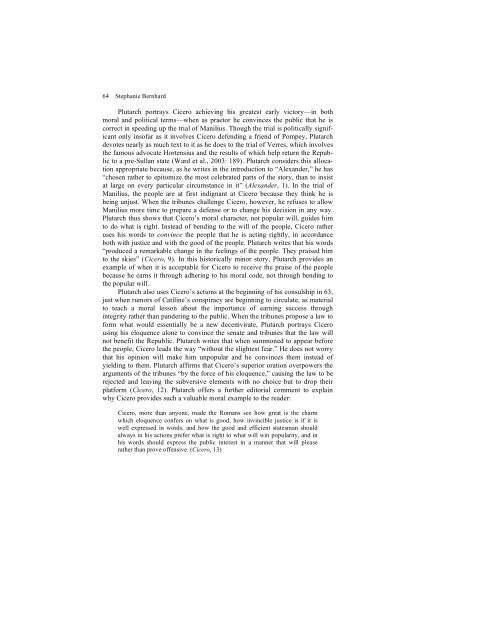Create successful ePaper yourself
Turn your PDF publications into a flip-book with our unique Google optimized e-Paper software.
64 Stephanie Bernhard<br />
Plutarch portrays Cicero achieving his greatest early victory—in both<br />
moral and political terms—when as praetor he convinces the public that he is<br />
correct in speeding up the trial of Manilius. Though the trial is politically significant<br />
only insofar as it involves Cicero defending a friend of Pompey, Plutarch<br />
devotes nearly as much text to it as he does to the trial of Verres, which involves<br />
the famous advocate Hortensius and the results of which help return the Republic<br />
to a pre-Sullan state (Ward et al., 2003: 189). Plutarch considers this allocation<br />
appropriate because, as he writes in the introduction to “Alexander,” he has<br />
“chosen rather to epitomize the most celebrated parts of the story, than to insist<br />
at large on every particular circumstance in it” (Alexander, 1). In the trial of<br />
Manilius, the people are at first indignant at Cicero because they think he is<br />
being unjust. When the tribunes challenge Cicero, however, he refuses to allow<br />
Manilius more time to prepare a defense or to change his decision in any way.<br />
Plutarch thus shows that Cicero’s moral character, not popular will, guides him<br />
to do what is right. Instead of bending to the will of the people, Cicero rather<br />
uses his words to convince the people that he is acting rightly, in accordance<br />
both with justice and with the good of the people. Plutarch writes that his words<br />
“produced a remarkable change in the feelings of the people. They praised him<br />
to the skies” (Cicero, 9). In this historically minor story, Plutarch provides an<br />
example of when it is acceptable for Cicero to receive the praise of the people<br />
because he earns it through adhering to his moral code, not through bending to<br />
the popular will.<br />
Plutarch also uses Cicero’s actions at the beginning of his consulship in 63,<br />
just when rumors of Catiline’s conspiracy are beginning to circulate, as material<br />
to teach a moral lesson about the importance of earning success through<br />
integrity rather than pandering to the public. When the tribunes propose a law to<br />
form what would essentially be a new decemvirate, Plutarch portrays Cicero<br />
using his eloquence alone to convince the senate and tribunes that the law will<br />
not benefit the Republic. Plutarch writes that when summoned to appear before<br />
the people, Cicero leads the way “without the slightest fear.” He does not worry<br />
that his opinion will make him unpopular and he convinces them instead of<br />
yielding to them. Plutarch affirms that Cicero’s superior oration overpowers the<br />
arguments of the tribunes “by the force of his eloquence,” causing the law to be<br />
rejected and leaving the subversive elements with no choice but to drop their<br />
platform (Cicero, 12). Plutarch offers a further editorial comment to explain<br />
why Cicero provides such a valuable moral example to the reader:<br />
Cicero, more than anyone, made the Romans see how great is the charm<br />
which eloquence confers on what is good, how invincible justice is if it is<br />
well expressed in words, and how the good and efficient statesman should<br />
always in his actions prefer what is right to what will win popularity, and in<br />
his words should express the public interest in a manner that will please<br />
rather than prove offensive. (Cicero, 13)

















